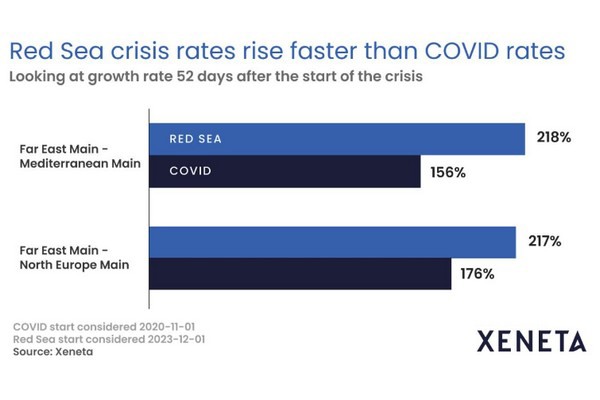The Red Sea crisis has seen ocean freight rates increase faster than in the early months of the Covid-19 pandemic as swathes of shippers are told some of their contracts will not be honoured.
Xeneta, an ocean freight rate benchmarking and intelligence platform, has released data that reveals shipping costs on key trades from the Far East to Europe spiked more than 200% in the first 52 days of the Red Sea crisis. This outpaces the increase in rates seen during the first 52 days of the pandemic.
"Rates have not hit anywhere near the levels we saw during Covid-19, but the sudden nature of the Red Sea crisis has seen a more rapid increase in rates, which is arguably creating even more disruption than during the early months of the pandemic," stated Emily Stausbøll, market analyst at Xeneta.
The impact of the Red Sea crisis, while more immediate, is not expected to be as prolonged as the pandemic – and shippers are becoming increasingly impatient and suspicious of carriers seeking to keep rates elevated for as long as possible.
This is backed by a poll of hundreds of Xeneta customers, which revealed almost two-thirds of shippers have been told their minimum quantity commitments (MQCs) are not being honoured under existing contract agreements, with carriers pushing them onto the freight of all kinds (FAK) market and higher rates.
Peter Sand, Xeneta chief analyst, commented, "Everyone is accusing everyone at the moment, which is normal during situations when there is so much uncertainty in the market.
"Ocean freight carriers did not invent this crisis and it takes time for them to put in new shipping networks to deal with the disruption caused by diverting away from the Suez Canal. However, you can also see this from the shippers’ perspective who may view the rate increases as carriers acting opportunistically to maximise the money they can make."
With the market expected to peak during February, it remains to be seen how long shippers’ patience will last.
Stausbøll added, "It is inevitable that rates will come down once carriers can deal with the capacity crunch in the Far East resulting from ships being delayed returning from Europe via the Cape of Good Hope. At the moment shippers may accept the carriers’ argument that it takes time to react to such an unexpected and sudden crisis, but that will only last so long and we may see rates begin to flatten or decline sooner than many anticipated."
For more information: container-news.com

